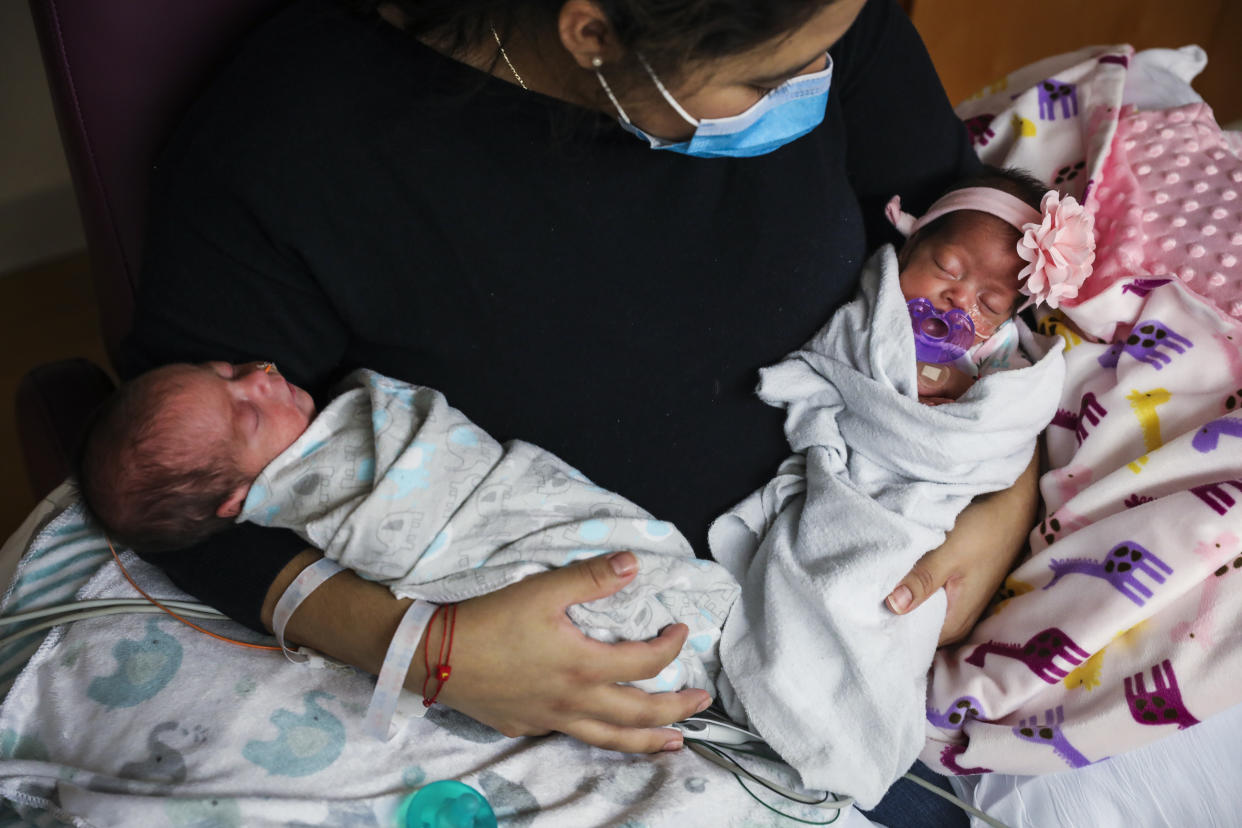Mothers unlikely to pass coronavirus infection to infants, systematic review finds

A new systematic review is providing more evidence that maternal transmission of COVID-19 is “uncommon” — and is not increased by vaginal birth, breastfeeding or close contact with the mother.
The study, published in BJOG: An International Journal of Obstetrics and Gynaecology on Monday, analyzed 49 different reports conducted worldwide on a total of 655 women and their 666 newborns (the sample included multiple sets of twins). Both vaginal birth and cesarean section were found to be low risk in terms of passing on the infection, but C-sections showed a slightly higher rate overall. In total, 292 women gave birth vaginally, eight of whom delivered a baby who tested positive for COVID-19; 364 gave birth via C-section, with 20 delivering infants with COVID-19.
On top of the reassuring news about the transmission itself, the researchers noted that 21 of the 28 babies who tested positive overall were asymptomatic, suggesting that even those who do contract COVID-19 are unlikely to become seriously ill. Dr. Gregory Poland, a professor of infectious diseases at the Mayo Clinic and director of the Mayo Vaccine Research Group, says the study bolsters other similar conclusions and should be considered comforting to women who are pregnant, as well as their families.
Related Video: Expecting Mothers Change Birthing Plans Amid Pandemic
“It’s not too surprising in that the spread of [COVID-19] is not so much through blood as it is the respiratory route and then introducing the virus through your hand from some infected surface,” Poland tells Yahoo Life. “For that reason, it’s very good news.” He notes that the higher rate of infection through C-section is worth paying attention to and that — where possible — it may be smart to “[develop] guidelines where a vaginal delivery might be preferable over a C-section.”
While he can’t confirm exactly what C-sections may pose a bigger risk, he says that overall they are a “bigger strain on an infected mother.” That’s not to say, of course, that they can’t be conducted safely. Last month, a woman in Boston gave birth to twins at 29 weeks via emergency C-section after becoming severely ill with COVID-19. The mom, Lisseth Hernandez, is recovering and both her babies are healthy.
In an email to Yahoo Life, Dr. Kate Walker, clinical associate professor in obstetrics at the University of Nottingham and lead author of the study, reiterated that the report is positive. “It’s really reassuring evidence for pregnant women or new [moms] that if they get COVID-19 infection during pregnancy, they can have a vaginal birth, breastfeed and not be separated from their infant,” Walker wrote.
She expanded on her motivation for the study in a statement posted on the University of Nottingham’s website. “There has been a lot of concern around whether pregnant women should be concerned for the health of their babies if they contract COVID-19,” Walker said. “We wanted to look at the outcome for babies whose mothers contracted the virus and see if the route of birth, method of infant feeding and mother/baby interaction increased the risk of babies contracting the virus. From our results, we are satisfied that the chance of newborn infection with COVID-19 is low.”
Similarly optimistic is Dr. Jeannette Comeau, a pediatrician focused on infectious diseases at Dalhousie University, who also participated in the study. “I am happy to see that the data continues to be reassuring, supporting keeping the mother/infant pair together after birth, underlining that while occasional postnatal infant infection is detected, the clinical course tends to be mild,” Comeau said, according to the University of Nottingham’s statement. “From the cases of infection in the newborn, we do not have confirmatory evidence that this infection was acquired in the womb or during birth.”
The Mayo Clinic’s Poland notes that it’s too soon to know why most infants thus far seem to be asymptomatic, suggesting that it could be due to a lower viral load or antibodies from the mother. He adds that while the information is encouraging, it’s no reason to stop following the Centers for Disease Control and Prevention’s protocol, including wearing face coverings in public, washing hands frequently and practicing social distancing.
“It doesn’t mean that mothers shouldn’t take precautions,” says Poland. “But it’s good news that the babies do well, good news that they’re able to have close contact with the baby and good news that they’re able to breastfeed — even if the mother is infected.”
For the latest coronavirus news and updates, follow along at https://news.yahoo.com/coronavirus. According to experts, people over 60 and those who are immunocompromised continue to be the most at risk. If you have questions, please reference the CDC’s and WHO’s resource guides.
How to maintain your physical and mental health during the pandemic
Taking care of a loved one with COVID-19? Here’s how to stay healthy
Q&A with Dr. Kavita Patel: How to keep your family safe and maintain your mental health
Read more from Yahoo Life
What's the difference between a 2nd wave and 2nd peak of COVID-19?
Pregnant women with coronavirus: New study finds majority were ‘asymptomatic’
Parenting expert says kids can start doing chores at age 2: 'It's almost never too young'
Want daily lifestyle and wellness news delivered to your inbox? Sign up here for Yahoo Life’s newsletter


